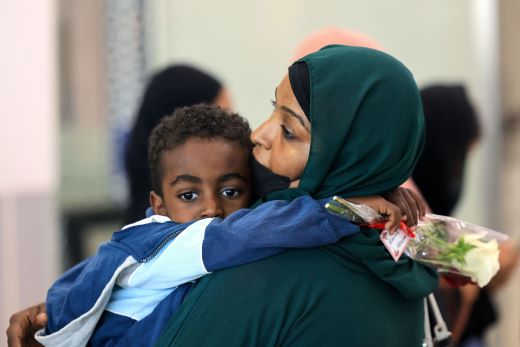14 MILLION children in Sudan urgently need humanitarian support following the breakout of armed conflict according to leading UN officials.
Fighting between the Sudanese Army and the paramilitary Rapid Support Forces (RSF), which began in April this year, recently passed the 100-day mark.
Ted Chaiban of the UN children’s agency, UNICEF and Edem Wosornu of the United Nations Office for the Coordination of Humanitarian Affairs (OCHA) spoke about the crisis facing children following their recent visit to the country and Chad, one of several neighbouring nations hosting approximately 900,000 people who have fled the violence.
Speaking at a media briefing Chaiban, UNICEF’s Deputy Executive Director for Humanitarian Action and Supply Operations, said the conflict is threatening the lives and futures of children and young people, who make up over 70 per cent of Sudan’s population.
Atrocities
He said: “I saw the total of the atrocities committed against children and women during the darkest days of the Darfur conflict 18 years ago. Both Edem and I were there. And I think we’re deeply concerned that we could be looking at a repetition of these terrible days.”
Chaiban highlighted the fact that children are being killed, injured, abducted, and even recruited into armed groups. They have fallen victim to ethnic- and gender-based violence, while the schools and hospitals they depend on are being damaged, destroyed and looted.
Children, both within Sudan and neighbouring countries, are vulnerable to hunger, disease, violence and separation from their families
Ted Chaiban, Deputy Executive Director for Humanitarian Action and Supply Operations, UNICEF
Chaiban said nearly 14 million children desperately need humanitarian relief – a number that is equivalent to all the boys and girls in Colombia, France, Germany or Thailand. Some 1.7 million have been driven from their homes, adding to the nearly two million who were already uprooted before the crisis.
“Parents are making the impossible choice of deciding whether to stay or leave, and leave everything behind they have known,” he said. “And those children who are on the move, both within Sudan and neighbouring countries, are vulnerable to hunger, disease, violence and separation from their families.”
Of the three million children in Sudan who are under the age of five, 700,000 are at risk of developing severe acute malnutrition and dying as a result. There is also a risk of disease epidemics if around 1.7 million children do not receive necessary vaccines.
“In White Nile State we currently have what is usually a lethal combination, which is acute watery diarrhea, measles and malnutrition in the same place, and that needs to absolutely be contained because otherwise the consequences are severe,” he said.
Toll
“Overall, I think the message is that we can’t accept the toll that this war is taking on Sudan’s children, their families and the future.”
This week, UN agencies reported that more than 20 million people across Sudan now face severe hunger and six million are on the brink of famine.
Nearly four million people alone have fled their homes to seek safety, including across the border into Chad, South Sudan, the Central African Republic, Ethiopia and Egypt.
Of those who remain, scores have been flocking to Port Sudan, the city on the Red Sea where the UN established a hub shortly after the fighting broke out.
Family and friends are taking in the newcomers, but many are struggling to fulfil their own basic requirements as rents rise and government workers go unpaid, according to Wosornu, director of OCHA’s Operations and Advocacy Division.
Horrors
She met with women in Port Sudan and the nearby town of Sinkat and said that “their stories keep me awake at night”.
“We are receiving credible reports of all sorts of horrors and the world needs to wake up and hear this,” she said.
Wosornu pointed to “the good news amidst all this gloom” as the UN and 93 humanitarian partners have been delivering aid wherever they can.
“We have been able to get to hard-to-reach areas,” she said. “We’re able to move trucks from Port Sudan to Darfur, and this is through de-confliction, talking to the parties to the conflict, allowing us to move goods as we could.”


Comments Form
2 Comments
thanks alot of informaton keren
The dual-heritage Arabic African Sudanese people have a long distinguished, and notable history of killing their purely African-Muslim peers; and their native non-Muslim, dark-skinned, African natives who lived in the South of Sudan.
There is nothing the West can do, other than send food aid, and arms.
I recall reading of the horrors inflicted by the Muslim Janjaweed against their fellow African Muslim peers in Darfur.
The decades of violence from Arabic-African Muslins against the non-muslin, dark skinned people of Sudan, which caused the largest African county to split.
Today, I am reliably informed Khartoum has been destroyed by Muslim fractional violence.
Is there any hope for the people and governments of Africa; other than killing, destruction, and starvation?